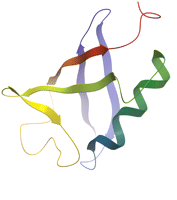A group of University of Texas researchers has elucidated the mechanism by which the protein ubiquilin-1 is linked to late-onset Alzheimer's disease (AD).
By genotyping and examining postmortem frontal cortex samples from 20 late-onset AD patients and 20 gender- and age-matched individuals with no cognitive impairment, they were able to determine that higher levels of ubiquilin-1 in the brain decreased malformation of amyloid precursor protein (APP). APP is the precursor molecule to beta amyloid, the primary component of amyloid plaques found in the brains of AD patients. Lower levels of ubiquilin-1 in the brain were associated with increased malformation of APP, the researchers reported in the online August 18
Journal of Biological Chemistry (see
Key Ubiquilin Study Findings).
"The genetic link of ubiquilin-1 to AD has been very controversial," Darren Boehning, Ph.D., an associate professor in the Department of Neuroscience and Cell Biology at the University of Texas Medical Branch in Galveston and a coauthor of the report, told Psychiatric News. "Our current work shows that, irrespective of genotype, ubiquilin-1 protein levels are decreased at all stages of AD progression."
The work of Boehning and colleagues was inspired by that of Rudolph Tanzi, Ph.D., and his colleagues at Massachusetts General Hospital. In the March 2005 New England Journal of Medicine, Tanzi's group published a study that demonstrated the link between the ubiliquilin-1 gene and AD.
Four single nucleotide polymorphisms (SNPs) in the ubiquilin-1 gene have been genetically associated with AD, implicating its gene product in the pathogenesis of late-onset AD. Boehning and colleagues describe the function of ubiquilin as that of a "chaperone," necessary to regulate the production of APP.
"The chaperone function of ubiquilin-1 described here may constitute a critical component of a protein quality-control network necessary to prevent irreversible aggregation and amyloidogenic processing of APP," they wrote.
The group said their results point to the maintenance and restoration of adequate levels of ubiquilin-1 and other cellular quality-control molecules as therapeutic targets to prevent APP-related cognitive decline in late-onset AD, but Boehning cautioned that current knowledge of ubiquilin-1 is not advanced enough to do that.
"At the moment, application of our findings is not possible," he said. "With confirmation in a larger cohort of patients, it would be of interest to pursue ubiquilin-1 as a biomarker of AD. But it wouldn't be feasible to increase ubiquilin-1 levels in the brains of AD patients."
The group plans to continue studying ubiquilin-1. "We are pursuing some other interesting biological effects ubiquilin-1 has on APP maturation and degradation," said Boehning. That work, which is being accomplished postdoctorally by (coauthors) Amina El Ayadi and Emily Stieren, is slated to be submitted for publication in the near future.
This work was supported by grants from the National Institutes of Health (NIH) and the Jean C. and William D. Willis Neuroscience Research Endowment. Cortical tissue samples were obtained from the Joseph and Kathleen Bryan Alzheimer's Disease Research Center, which is funded by NIH.


